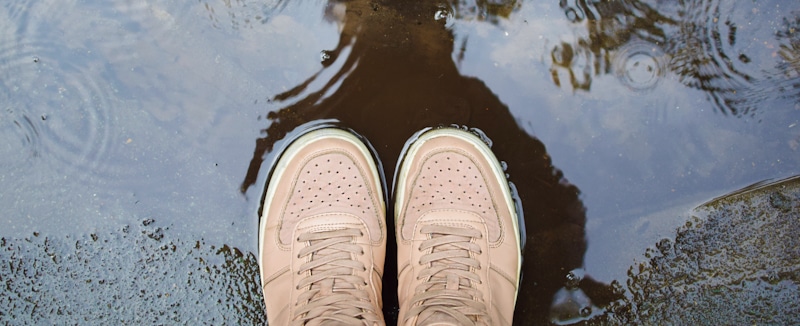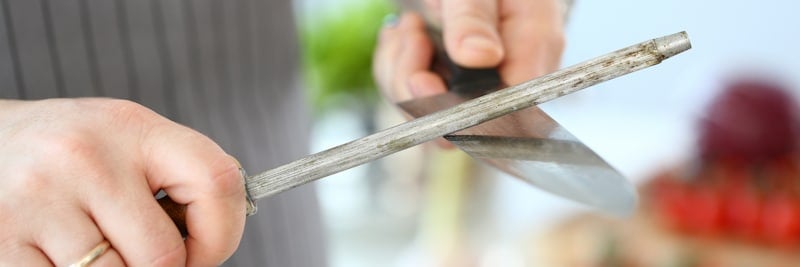The words “wet” and “whet” sound alike and have almost identical spellings too. However, they could not be any more different with their meanings. And that is essentially how homophones work!
The term “wet” denotes “being drenched in water or any other liquid”. “Whet”, on the other hand, means “to sharpen, hone” or “to stimulate”. “Wet” can be used in sentences as an adjective, verb, and also as a noun. “Whet” is almost always a verb. If you’re taking appetite, it’s always “whet”.
Though “wet” is a pretty straightforward term, the possibility of getting it mingled with “whet” gives rise to the need to know the word in a bit more detail. To understand the two terms “wet” and “whet” and how to use them in sentences or various writing contexts, keep reading.

“Wet” – Definition
As mentioned above, the term “wet” is ubiquitous and doesn’t require much explanation. But to cover all bases, “wet” means “fully covered or filled with moisture”. A simpler or more relatable definition is “drenched in water”. Alternative or other words for the term include “damp”, “drenched”, “logged”, “dripping”, “soaked”, “watery”, etc.
“Whet” – Definition
“Whet” means “to hone or sharpen” or “to enhance or stimulate”. Figuratively speaking, the word denotes the state of becoming “acute” or “keener”. Also, it might indicate “wit”, “interest”, “desire”, etc.
The term may seem like a relatively new word or having its roots in the word “wheat”. But “whet” is neither recent nor it has anything to do with wheat.
“Whet” has been around as a valid English word since the 1400s. It’s a combination of “hwettan”, an Old English word, and the German word “wetzen”, which means “sharp”. “Wetzen” has also inspired another term, “whetstone”, a tool or kind of stone used for sharpening blades.
Not to mention, “whet” is quite similar in meaning to “pique”, which means “to arouse curiosity/interest” or even “to irritate”.

Using the Word “Wet” in Texts
The term “wet” is used in writings primarily as an adjective and at times as a verb. The following sentences use “wet” as an adjective:
- The wall has quite a few wet patches.
- Brass can quickly tarnish in wet weather.
Here are a few sentences incorporating “wet”, the verb:
- Wet the piece of cloth before wiping.
- Wet your hands prior to using the soap.
- The cat had wet the mat.
Though rare, it’s also possible to use “wet” as a noun. However, to avoid confusion, or for a better flow or a much-improved reading experience, the noun form of the word or “wetness” is invariably used instead of “wet”. For example:
- The wetness from the ground made living in the basement impossible.
Not to mention, “wetness” in the above sentence could be replaced with “wet”.
Phrases with the Term “Wet”
The word “wet” features in quite a few phrases or “idioms”. The following are some of them with their meanings and an example sentence:
- Getting feet wet: To start or try something. “She obviously cannot do the job as she hasn’t got her feet wet yet”.
- Wet your whistle: Having something to drink. “She is at the local club wetting her whistle.”
- Be all wet: Besides its literal meaning, it could also mean “to be completely wrong”. “We need a fresh ad campaign as the existing one is all wet.”
- Sopping wet: Completely soaked or drenched in water or some other liquid. “Find a dry spot before you become sopping wet”.
- Wet behind the ears: Inexperienced due to age. “She has just graduated business school and is wet behind the ears to assume the huge responsibility.”
- A wet blanket: Ruining the fun of other people. “Do not invite Tom to the party. He is a wet blanket who’ll constantly be bickering the entire time.”
The above expressions are perhaps a few of the several phrases that use “wet”. It’s, therefore, possible to add more phrases with “wet” to the above list.

Using the Term “Whet” in Writings
The term “whet” is primarily used in texts to denote “sharpening”. For example:
- She whets her knife before slicing the meat.
Also, as mentioned above, “whet” could be used symbolically. The phrase “whet your appetite”, for instance, uses the word figuratively. It means “sharpening your desire for food”. An example sentence:
- Do not feast on the dish. It’s just a starter and meant to whet your appetite.
The meaning is not always gastronomic. It could also be translated as “inducing or increasing your interest in something”. For example:
- The novel’s first chapter truly whetted my appetite. I would now like to read the entire thing.
- My friend presented me a book about the art of drawing, and it genuinely whetted my appetite.
- Here are a few pictures of the new paintings to whet your appetite.
If you’re whetting a sword, knife, etc., you are merely making the tool sharper.
The Confusion Between “Wet” and “Whet”
As mentioned above, “wet” is an easy word to remember the meaning and spelling of. “Whet”, on the other hand, is not as common, and quite a few people may either not know the meaning of the word or could confuse it for “wet”. Some may not even know about the existence of the term and may dismiss it as a misspelling.
Since it sounds the same as “wet” when pronounced and has almost-identical spelling too, it’s likely to confuse writers or cause them to use “wet” instead of “whet”, or vice versa.
The following are a few examples of the misuse:
- With over 100 restaurants, people visiting the daily market can calm their hunger pangs or whet their whistle with various food and drinks on offer.
- The barbecue chicken and the drinks should wet your appetite.
When a particular food item “whets your appetite”, you drool, getting “wet”, in the process, in the mouth. This may make some people believe “wet your appetite” to be the right phrase or cause confusion between “wet” and “whet”.
Regardless, “whet” and “wet” are not interchangeable, or they mean diametrically opposite things. “Appetite” is not tangible and cannot be “wet”, as a result.
Also, “wet your whistle” is commonly referred to as “whet your whistle” as the “wh-” in both the terms seem like a good fit. This mental inclination can be likened to how “sneak peek” gets incorrectly phrased as “sneak peak” as the latter two have “-ea-” in them.
The human brain tends to look for a pattern in words, so such errors stem. Even the most accomplished writers or language experts could at times fall prey to this word trap.
Remembering the Right Term to Use in the Idioms
To not confuse “wet” and “whet” in some of the expressions mentioned above, consider the logic behind the phrases or the words in them.
For example, in the phrase “wet your whistle”, “whistle” is the metonym (substitute) for “mouth”. Therefore, the word means “wet your mouth”, and it’s relatively easy to see how the term came into being.
Similarly, a mouth-watering dish may “wet” your palate, but it won’t “wet” your appetite – which is why the expression is “whet your appetite”.
Example Sentences with the Term “Wet”
Here is a list of sentences that incorporate the term “wet”, primarily as an adjective:
- I am all wet, thanks to the thunderstorm and me not carrying an umbrella.
- The dryer is not working as my outfits are all wet.
- The floor is wet, so watch each step you take.
- A raincoat prevents your outfits from getting wet.
- I dried her wet hair using the blow dryer.
- The hot weather prompted the kids to dive into the pool and get wet.
- There are wet patches all across the wall.
- She was wet with sweat.
- She wet the piece of cloth with some water and placed it on the kid’s forehead.
- The road was slippery and wet.
- Thanks to the rain last night, the ground is wet.

Example Sentences with the Word “Whet”
The following are sentences incorporating the term “whet”:
- He whetted the blade’s edge against the stone.
- Here are some hors d’oeuvres for whetting your appetite.
- The book shall whet your appetite for learning about the Australian colony in a bit more detail.
- The last trip to Japan only whetted his appetite to travel more.
- These articles are both to inform and whet the prospective admission candidates’ curiosity.
- Appetizers serve to whet one’s appetite.
Conclusion
Most of the confusion between “wet” and “whet” and similar-sounding terms or homophones could be primarily due to how people just listen to words or mishear them. However, people who do a fair bit of reading are highly unlikely to mistake one word for another as they have seen the word by the letter.
This article may have helped alleviate the confusion or doubts you might have had between “wet” and “whet”. But if you want to sharpen your writing skills and ensure you do not use the wrong words in texts going forward, make sure you read a lot.
To conclude, just remember “interests”, “appetites”, “desires”, etc., cannot be “wet” or saturated or covered with liquid. They can only be “whetted”.
Shawn Manaher is the founder and CEO of The Content Authority. He’s one part content manager, one part writing ninja organizer, and two parts leader of top content creators. You don’t even want to know what he calls pancakes.

